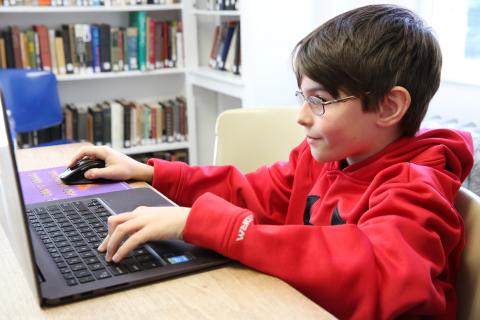This is a tough question. SVS lacks the more traditional ways of bench marking a child’s progress through school. There are no parent-teacher conferences, no grades, no MCAS scores, no curriculum, no classes and no grade point averages. There is no homework nor textbooks that might give parents a hint of what is being “learned”. All these measures, as flawed as they may be, can still provide parents some sense of what is happening in their child’s educational life.
Without the measures of traditional schools, parents need to rely on more direct interaction with their children, their friends and even the parents of their friends to get a glimpse of the learning going on at their school. This can be hard because even SVS students can reply, “Nothing” to the question, “What did you do at school today?” This response of course only re-enforces a new parent’s fears about SVS. I learn a lot by driving my kids and their friends around. Bits of conversations can provide insights to school, it can also teach you the vocabulary to use.
Knowing that the school meeting happens on Thursdays, on Thursday afternoon I can ask if anything interesting happened at school meeting today. Of course, the Judiciary Committee (JC) meets every day, so you can ask about that, or ask if your kid ever attends JC. Getting kids to tell you about what they think of a particular JC complaint can be rewarding. One of my daughters was bothered that in one complaint against two kids, the kid who was perhaps the more “guilty” got a lighter sentence because they cooperated with the investigation, while the other “less” guilty was un-cooperative and received a more severe sentence. Was that fair? A serious and interesting question, and until I asked about JC one day, I was unaware that my daughter gave such weighty issues any thought at all.
Other parents often give you nice feedback, we tend to interact with our own children, as if they are still at a younger age. This limits our ability to experience our own children in age appropriate ways. But it can be very rewarding to hear from another parent about a conversation they had with your kid and how mature and articulate they were at explaining something they were engaged in.
SVS holds several open houses each year. I believe their primary purpose is to provide an opportunity for prospective parents and students to visit SVS. Current students and parents also attend and sometimes serve as tour guides for other guests. So these events provide a great opportunity to meet other parents and see SVS students in their native habitat. At a recent open house, I watched one of my daughters and her friend field questions from a group of Harvard Education students visiting the school. For about 20 minutes, the two SVS students gave well thought and well-articulated responses to a wide variety of questions from the Harvard students. The students spoke clearly, used full sentences, and utilized multi-syllabic words. These are things I rarely see in my day to day interaction with my daughter. I took that as strong evidence that learning is taking place.
For folks who worry about children spending too much time with electronic devices, I offer a small nugget of encouragement. I periodically try to talk to my kids about current events. Recently, on the way home from school I mentioned some very current news tidbit that I thought important. Holding her iPhone up, she said, “Yeah, I read about that this morning”, and we had a brief discussion about it. So, in addition to all the many things she does with her iPhone, that I don’t understand, she apparently has a news feed that keeps her up to date on current events.
Years ago, I wrote a blog about how I learned that my kids were “playing school” https://sudburyvalley.org/blog/playing-school-sudbury-valley, at SVS and doing math worksheets. That experience provided me evidence of learning. This current blog was inspired when I learned that my kids and their friends had initiated a “book group”. They wanted to all read a book more or less at the same time so they could talk about it at school. At first, they had a hard time picking a book because they needed something none of them had read yet. They finally settled on a book recommended by a fellow SVS student outside their book group. They borrowed several copies from libraries, and bought three copies from Amazon, and all started reading just a few days ago.
My experience with book groups is that they are not common in school age or even young adults. It’s not until we have aged a bit that we realize the possible wisdom that can be gained from sharing a reading experience with others. This leads me to believe that these SVS kids are way ahead of their traditional school peers in their approach to learning. Seeing this take place is so much more satisfying than a nice note from a teacher, good grade on a test, or a good MCAS score. Those are all static temporal things, seeing the kids take up a behavior that supports lifelong learning is so much more valuable.
So, for this month at least, learning at SVS looks like a book group. Tomorrow, next week or next month, learning will look like something else. I eagerly await the next insight in their growth.


